Search Results
Showing results 1 to 16 of 16
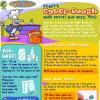
Digit's Cyber-Dough
Source Institutions
In this fun hands-on activity, learners whip up a batch of cyber-dough (play dough) using math for measurements.
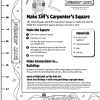
Make Ziff's Carpenter's Square
Source Institutions
In this Cyberchase activity, learners make carpenter's squares and use them to measure square corners. Learners cut out the carpenter's square template and attach it to tagboard.
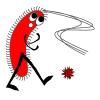
Comparing Sizes of Microorganisms
Source Institutions
In this activity related to microbes, learners create scale models of microorganisms and compare relative sizes of common bacteria, viruses, fungi and protozoa using metric measures: meters, centimete
Build a Bridge
Source Institutions
In this activity, learners use recycled materials to build a bridge that holds as many potatoes as possible. They investigate weight, height, strength, and measurement as they seek design solutions.
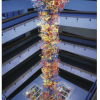
A Towering Achievement
Source Institutions
In this experience, learners use the internet to research physical details about Chihuly's Fireworks of Glass "Tower" and "Ceiling" and consider the decisions Chihuly had to make as he was planning th

Space Stations: Sponge Spool Spine
Source Institutions
In this activity, learners simulate what happens to a human spine in space by making Sponge Spool Spines (alternating sponge pieces and spools threaded on a pipe cleaner).

Size, Scale and Models
Source Institutions
In this activity, learners take measurements and create charts to learn about the size of dinosaurs and their relative scale to humans.
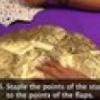
Party Hat Symmetry
Source Institutions
In this hands-on activity, learners make New Year's Eve party hats out of wrapping paper. Learners use symmetry and measurement to cut out shapes they need to assemble the hats.
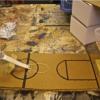
Finger Basketball
Source Institutions
In this activity, learners build mini-basketball courts using cardboard and measuring spoons. Use this activity to introduce learners to catapults, forces, and levers.
Math and Creativity Posters
Source Institutions
These math posters have questions written on them, such as: How many colors can you name in a minute? or How many seconds can you balance on one foot?
Soaring Towers: Building with Recycled Materials
Source Institutions
In this activity, learners will build the highest tower they can out of recycled materials.
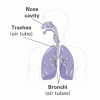
Heart and Lungs
Source Institutions
In this environmental health activity, learners investigate their breathing and pulse rates, and learn how these measurements are affected by physical activity.
Building Houses: Build a Cardboard Tube House
Source Institutions
Build a house you can fit inside, using cardboard tubes.
Giant Museum: Create a Scale Model
Source Institutions
In this activity, learners will predict the size of a giant scale model of a comb or other rectangular object, then make one. If you tripled the size of a dollar bill, could you sit on it?
Double or More
Source Institutions
Choose a recipe to double (or triple, quadruple, or halve). Show everyone the recipe and engage them in figuring out: How much will we need to increase the recipe to feed everyone?
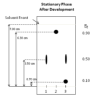
Chromatography Can Separate!
Source Institutions
In this chemistry activity, learners use thin layer chromatography to determine the molecular composition of different markers.
